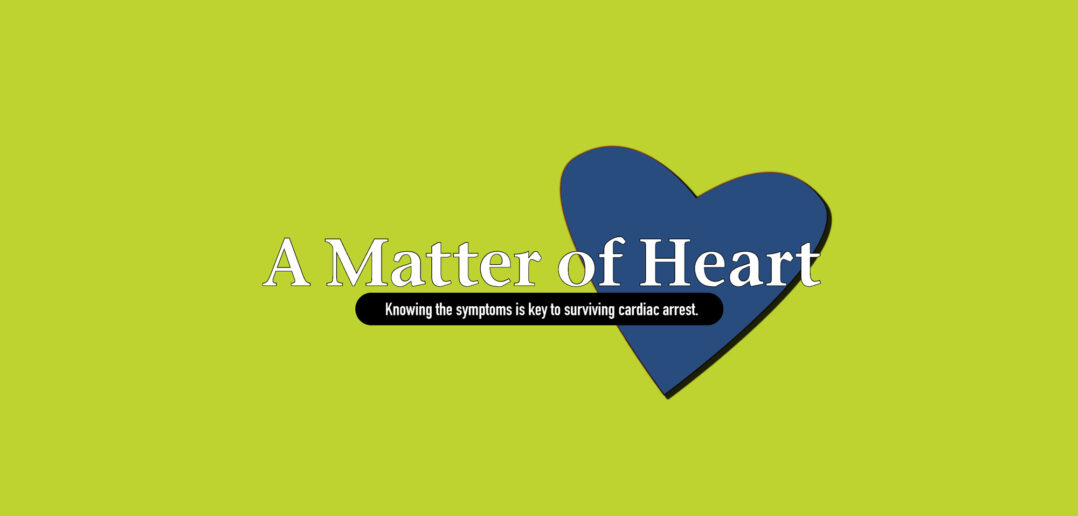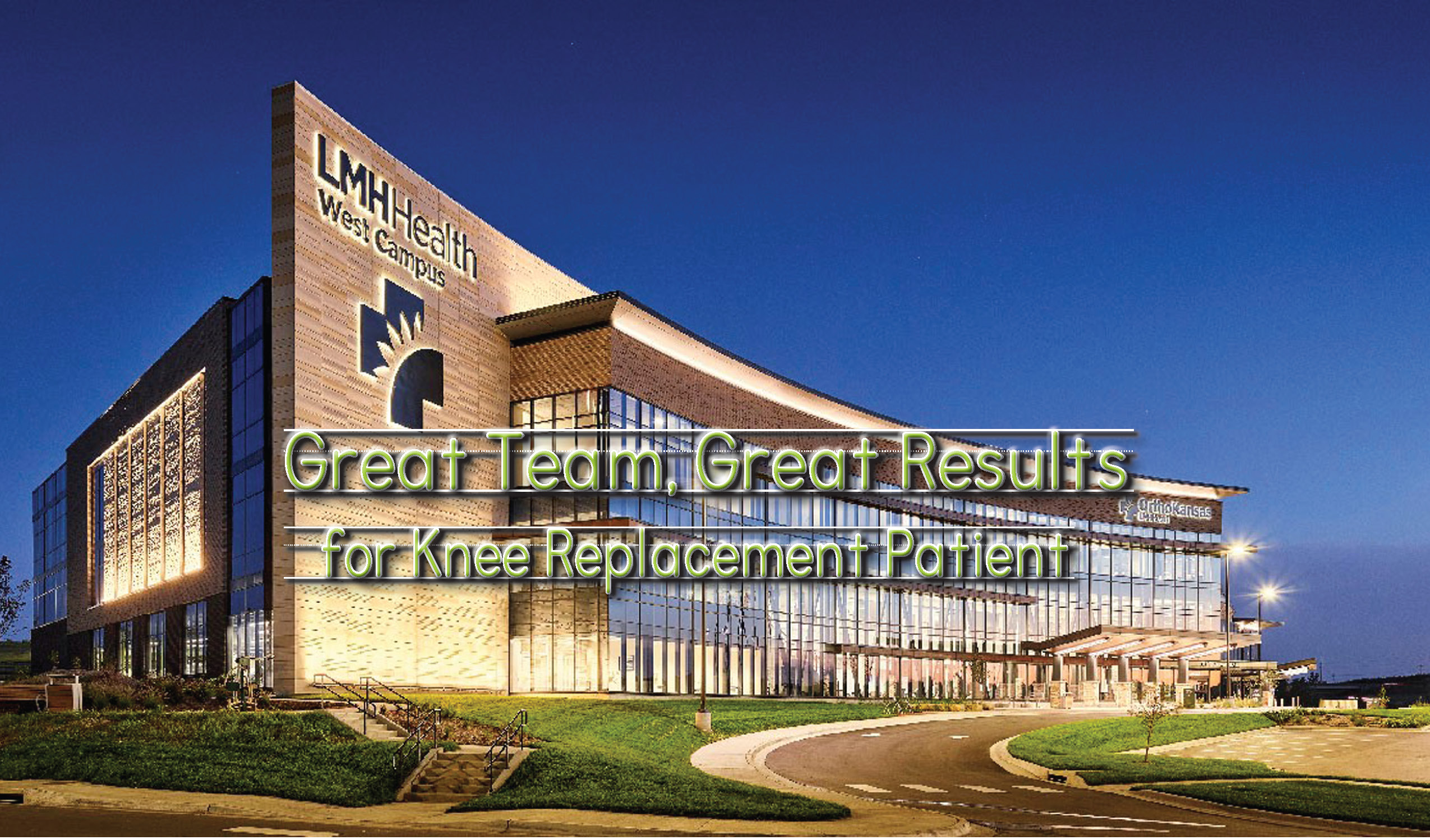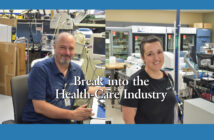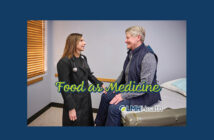| story by | |
| photo by | Steven Hertzog |
| OPEN A PDF OF THE ARTICLE |
Knowing the symptoms is key to surviving cardiac arrest.

Donna Oleson, Elizabeth Guastello, photos by Jeff Burkhead
Donna Oleson has always been a woman on the go, wearing a number of other hats during the years. She spent 25 years working as the Eudora city clerk before retiring a decade ago. She then took on a role as an administrative assistant at Bert Nash Community Mental Health Center and planned to only be there for a year or two, but somehow it stretched into another 10-year career.
“I decided to retire from Bert Nash in September 2022 because I was turning 70. If I didn’t do it then, I wouldn’t do it at all,” she explains.
But she didn’t sit still for long. Oleson took on another challenge, working as a paraprofessional at Eudora Elementary School. She’d only been working there for a couple of weeks before catching the COVID-19 virus. Once she recovered, she headed back to work.
It was no wonder that she was tired due to her busy lifestyle and recent bout with the virus, but it seemed that she was tired all the time. Oleson mentioned the exhaustion to her doctor, but since she wasn’t having any other symptoms, they chalked it up to being an active 70-year-old. That all changed on a Saturday afternoon in September.
“I’d been cleaning the living room, and I remember thinking I was tired, and I should sit down,” she says. “I dozed off, and when I woke, I knew something wasn’t quite right.”
Be on the Lookout
According to the Centers for Disease Control and Prevention (CDC), heart disease is the leading cause of death for both men and women in the United States. One person dies every 34 seconds from the disease.
The most common symptoms of a heart attack are:
- chest pain or discomfortfeeling weak, lightheaded or faint
- pain in the jaw, neck or back
- pain or discomfort in one or both arms or shoulders
- shortness of breath.
Elizabeth Guastello, MD, a cardiologist with Cardiovascular Specialists of Lawrence, says other symptoms can occur in both women and men, such as nausea, vomiting, sweating or feeling like you just have the flu. If there’s a weird presentation, nine times out of 10, it will occur in a woman.
”If you feel like you’ve got an elephant sitting on your chest, pain radiating down your arm or jaw pain, it’s vital that you get checked out immediately,” she explains. “Call 911 and get to the emergency room. Time is heart muscle.”
Oleson has long been active with the American Heart Association and Go Red for Women, so when she began to vomit and felt intense heart pain, she knew something was wrong. She began to bang on the wall to get her granddaughter’s attention and told her she thought she was having a heart attack. They called 911, and when the paramedics arrived, they told Oleson she was right.
“They loaded me in the ambulance and put nitroglycerin under my tongue,” she says. “I remember telling them that it hurt so badly, but that’s it until I got to the hospital and found out I’d flatlined, and they had to perform CPR.”
Family History Plays a Role
LOCAL MATTERS
Our Local Advertisers – Making a Positive Impact
Oleson doesn’t present as someone who might be susceptible to a heart attack. She never drank or smoked, and made sure to exercise regularly. There was one thing she had stacking the odds against her: family history.
“I come from a family of six—five girls and a boy,” she says. “Both of my parents died from heart issues. My mom passed within the week of her 66th birthday and my dad when he was 68. Both of them had previously had bypass surgery.”
Family history and genetics can play a significant role in your potential for developing heart disease or having a heart attack. Guastello says that while not everyone with a family history of cardiac issues develops problems, it can be more likely.
“We see other people who don’t have any risk factors. If your father had a heart attack at 45, it can be a strong indicator for you, as well,” she explains. “It’s important to remember that just because it happened to them doesn’t mean that it will happen to you.”
If you have concerns about your heart health, Guastello says knowledge is power. It’s important to know your weight, cholesterol level, blood pressure and whether you have diabetes. Having high numbers can lead to increased plaque in your cardiovascular system, which, in turn, can lead to heart disease and heart attack.
“If you have risk factors, it’s important to see your doctor. Your primary care provider can help you get those numbers where they need to be,” she adds.
Prevention is Key
Knowing your risk is key to preventing heart disease. Once you’ve made an assessment, it’s important to create a prevention plan. Guastello says there are a number of steps you can take to improve your health.
“It’s important to be physically active and move more,” she continues. “Staying at a healthy weight and eating a healthy diet will also help to reduce your risk. And if you smoke, now is the time to quit.”
If you do have family or lifestyle risk factors, you’re not alone. Making small changes can make a huge difference. Talk with your health-care provider to find out what you can do now to lower your risk later.
In the End
Oleson’s decision to call paramedics instead of having her granddaughter drive to the hospital saved her life. Not only did she flatline in the ambulance, Oleson had a total blockage of one artery, and another was 90% occluded.
“Donna had what you might know as a widow-maker,” Guastello explains. “The proximal left anterior descending artery supplies blood to the front of the heart. In the past—before coronary intervention—someone would usually die, which is how it got the name.”
Interventional cardiologist Alan Berger, MD, placed a stent in one artery immediately, followed by a second one three days later. After spending a few days in the hospital, Oleson went home to begin outpatient treatment and rehab.
“It’s been quite a year—it was a heck of a way to celebrate my birthday,” Oleson says. “I’m so lucky to have survived and to have received the outstanding care that I did at LMH Health. They took great care of me.”
Know Your Score
A tool available to help determine your heart health is a coronary calcium score. Guastello says during this simple imaging procedure, patients undergo a CT (computed tomography) scan that looks for calcium in the arteries.
“If you score a zero on the test, there isn’t any plaque present, and that can provide you with peace of mind,” she explains. “Scores of one or greater indicate that you’ve got coronary artery disease, and then we can begin treating you appropriately.”
Coronary calcium scores are done on a regular basis at both the LMH Health Main Campus and West Campus. The test costs about $60 and isn’t usually covered by insurance. While a referral isn’t required, Guastello recommends asking your primary care provider to order the test so he or she can receive the results. If cost is a factor, the LMH Health Foundation may be able to assist.




